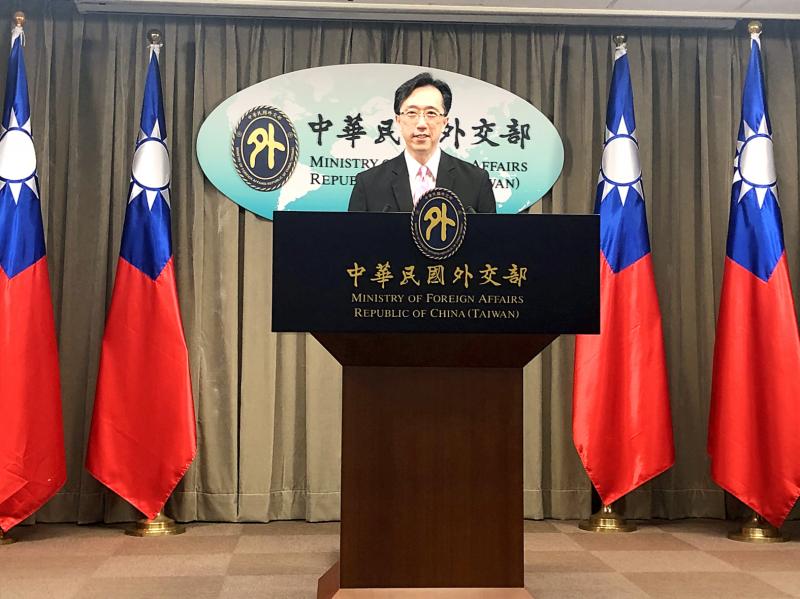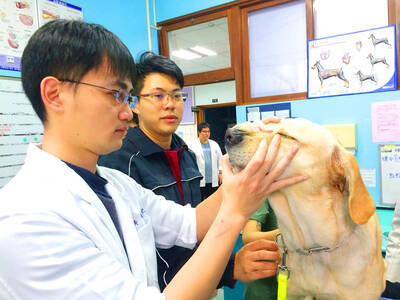The international community must protect trade secrets and intellectual property rights, Deputy Minister of Foreign Affairs (MOFA) Tien Chung-kwang (田中光) told the opening day of a Taiwan-Japan-US workshop yesterday.
The Global Cooperation and Training Framework workshop includes representatives from the three nations, more than 180 law enforcement officials and experts from 19 nations in the Indo-Pacific area, attending in person and virtually.
The discussion yesterday focused on protecting trade secrets and intellectual property rights (IPR), the Ministry of Foreign Affairs said in statement.

Photo: Lu Yin-hsuan, Taipei Times
At the opening ceremony, Tien urged unity to protect trade secrets and intellectual property rights, saying that they are important components of economic growth and competitiveness, the ministry said.
American Institute in Taiwan (AIT) Director Brent Christensen highlighted the importance of the “four I’s” — the virtuous cycle of interaction, IPR protection, investment and innovation — the AIT said in press release.
“Advanced economies all recognize that intellectual property rights protection is the key ingredient to attract investment and encourage innovation in order to compete in our modern global economy,” Christensen said.
Prosecuting theft of trade secrets and stopping digital piracy of copyrighted content are the issues being highlighted at the workshop, which concludes today, the AIT said.
Representatives from the High Prosecutors’ Office, the Intellectual Property Office, the US Department of Justice and the FBI are among the participants sharing their experience and discussing best practice for prosecuting cases of trade secrets theft and digital piracy, the AIT said.
The workshop has been divided into three sessions, with participants discussing the latest developments in trade secrets regulations and common challenges in combating IPR infringements, North American Affairs Department Director-General Douglas Hsu (徐佑典) said at a news conference.
Japan-Taiwan Exchange Association Deputy Representative Yokochi Akira also attended the opening ceremony.
The workshop was organized by MOFA, the AIT and the association.

Former Czech Republic-based Taiwanese researcher Cheng Yu-chin (鄭宇欽) has been sentenced to seven years in prison on espionage-related charges, China’s Ministry of State Security announced yesterday. China said Cheng was a spy for Taiwan who “masqueraded as a professor” and that he was previously an assistant to former Cabinet secretary-general Cho Jung-tai (卓榮泰). President-elect William Lai (賴清德) on Wednesday last week announced Cho would be his premier when Lai is inaugurated next month. Today is China’s “National Security Education Day.” The Chinese ministry yesterday released a video online showing arrests over the past 10 years of people alleged to be

THE HAWAII FACTOR: While a 1965 opinion said an attack on Hawaii would not trigger Article 5, the text of the treaty suggests the state is covered, the report says NATO could be drawn into a conflict in the Taiwan Strait if Chinese forces attacked the US mainland or Hawaii, a NATO Defense College report published on Monday says. The report, written by James Lee, an assistant research fellow at Academia Sinica’s Institute of European and American Studies, states that under certain conditions a Taiwan contingency could trigger Article 5 of NATO, under which an attack against any member of the alliance is considered an attack against all members, necessitating a response. Article 6 of the North Atlantic Treaty specifies that an armed attack in the territory of any member in Europe,

LIKE FAMILY: People now treat dogs and cats as family members. They receive the same medical treatments and tests as humans do, a veterinary association official said The number of pet dogs and cats in Taiwan has officially outnumbered the number of human newborns last year, data from the Ministry of Agriculture’s pet registration information system showed. As of last year, Taiwan had 94,544 registered pet dogs and 137,652 pet cats, the data showed. By contrast, 135,571 babies were born last year. Demand for medical care for pet animals has also risen. As of Feb. 29, there were 5,773 veterinarians in Taiwan, 3,993 of whom were for pet animals, statistics from the Animal and Plant Health Inspection Agency showed. In 2022, the nation had 3,077 pediatricians. As of last

XINJIANG: Officials are conducting a report into amending an existing law or to enact a special law to prohibit goods using forced labor Taiwan is mulling an amendment prohibiting the importation of goods using forced labor, similar to the Uyghur Forced Labor Prevention Act (UFLPA) passed by the US Congress in 2021 that imposed limits on goods produced using forced labor in China’s Xinjiang region. A government official who wished to remain anonymous said yesterday that as the US customs law explicitly prohibits the importation of goods made using forced labor, in 2021 it passed the specialized UFLPA to limit the importation of cotton and other goods from China’s Xinjiang Uyghur region. Taiwan does not have the legal basis to prohibit the importation of goods